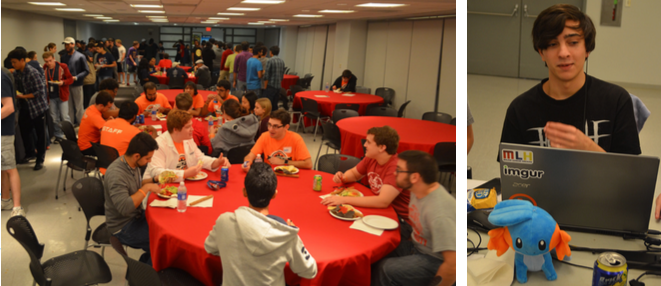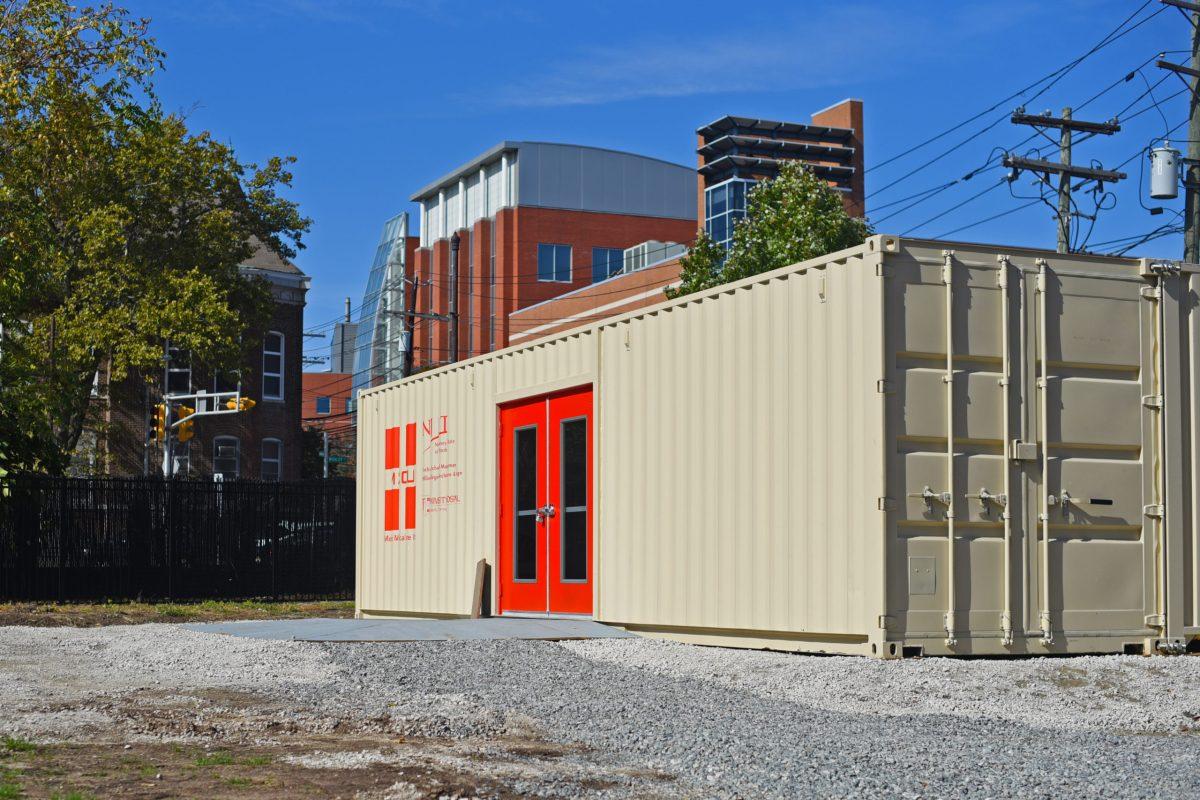By Stephen Chan, Executive Editor
Challenging.
That is what the Association for Computing Machinery’s Vice President Eduardo Preciado thought about the second annual Hackathon. The event, which is a group project development based competition, is a 24 hour coding fest that saw the attendance of over a hundred individuals and tested the limits of passion and caffeine.
Preciado, a junior Computer Science major, typically enjoys these types of events. Sadly, as an organizer and supervisor acting on behalf of ACM, he could not actually participate in the festivities. Instead, he spent the time helping teams with any questions they had.
“The hardest part about this year’s Hackathon was that me and Theresa [Wagner, co-organizer] did not know how to do it at first,” said Preciado. “Last year, Timothy Boyle and Grant Butler were responsible for organizing everything, and we just followed what they did. Really, we had to go about learning things as we did them in terms of registration. Plus, we had to properly advertise to the right people if we wanted people to attend. It was pretty successful because we had roughly 75 people from other schools come for the Hackathon.”
“We had three times as many people this year than last time,” said Preciado. The Campus Center Ballroom was packed. Wires lined the walls and tables. Hundreds of computers littered the desks. Snacks were everywhere.
Last year was NJIT’s first Hackathon. Before ACM officially sponsored a Hackathon, NJIT had no code fest to cater to programmers.
Organizing it was an ordeal. “We had no idea how many people to accept for registration, and only a third of the people that registered last year showed up for it,” said Preciado. “This year, Major League Hacking, the official student Hackathon league, said to expect almost a third of the people that registered. We opened up registration to about six hundred people this year. A hundred-fifty of them showed up.”
The amount of attendees at the event were more than ideal. “We only have space for around 200 people. If we had more than what we could fit in the ballroom, we would probably have accommodated them outside,” said Preciado. Registration was open to all undergraduate and graduate students from any school, not limited to just NJIT. This is common for most Hackathons, and will likely be the case next year.
“We are aiming to reach roughly 200 people next year. More specifically and reasonably, we want around 175 attendees,” said Preciado.
The event was also attended by a hefty number of sponsors, including Linode, Prudential, and ADDTEQ. Other than coding, one of a Hackathon’s most popular features is perhaps the incredible networking that happens as attendees work. Attendees who speak to sponsors and show them projects also introduce themselves to the company. If the company likes the project, they may be interested in hiring the programmer responsible. Additionally, companies can forward information to and from attendees about job opportunities.
Unfortunately, not all of the sponsors were able to attend the event. Lockheed Martin, AT&T, and Juniper were all unable to attend. However, they still expressed their support of the Hackathon, and continued to sponsor the event despite their absence.
After the 24-hour coding period ended, there was a demonstration session where teams had to present the work they did over the past day. Twenty-three teams, each containing up to a max of four people, registered for the event, and all of them presented their work during this time. Preciado especially liked this portion of the Hackathon. “I definitely liked the fact that we were able to do a demo style presentation,” he said. “Most hackathons are so large that judges walk around to every table. Because we were a smaller Hackathon, we see everyone’s project. If we get more people and teams, then next year we will have to do it traditionally.”
Several prizes were given to the best projects. NJIT gave out first, second, and third prizes to best overall presentations. Companies also gave out prizes to projects that met various criteria.
Examples
ADDTEQ gave $500 to group Studybuddy for the best use of their API, Hipchat. Studybuddy used Hipchat to create a group for somebody that needed to study for a particular subject.
Linode, who donated some servers to NJIT before the Hackathon, gave a Raspberry Pi 2 to group Shortview for creating an impressive real-time visual representation on the processes being run on a Linode server.
Company FDM Group gave out a prize to CardiAudio, for most innovative app. CardiAudio, monitors users’ running on their phones. Runners who ran at normal speed had their sound play normally, but users who ran below a set threshold had music that slowed down as the bit-rate became worse and the quality decreased. FDM also gave $500 to Project Reach, for best user interface and gave Shortview $1000 for best overall hack of the event.
The event ended without incident, and ACM looks forward to having the next one. “Next year Theresa and I will most likely be managing this event again,” said Preciado. He thanked several people, including volunteers and members of ACM, for assisting for the full 24-hour period. He also had words for faculty who offered their services to the event. “Thorin Aiello from the Gourmet Dining Services worked closely with Serena Branson, CS department secretary, and they were able to help us pick the menu and tailor it to our needs. That was a great help.”
While this is ACM’s biggest event of the year, Preciado also wants students to remember that ACM is available year-round to help programmers with whatever they need. “We usually hold study sessions for lower level CS classes. At Minicon, NJIT’s official comic convention, we hold a gaming section that runs on ARTEMIS and emulates a starship’s bridge. We also have various tech companies speak to students during sessions throughout the year.”
“I think that [the event] ran really smoothly, it was definitely an improvement from last year. Thanks to MLH, we were able to keep everything running smoothly throughout the night. We want to extend an invitation for everyone to come again next year,” said Preciado.
































